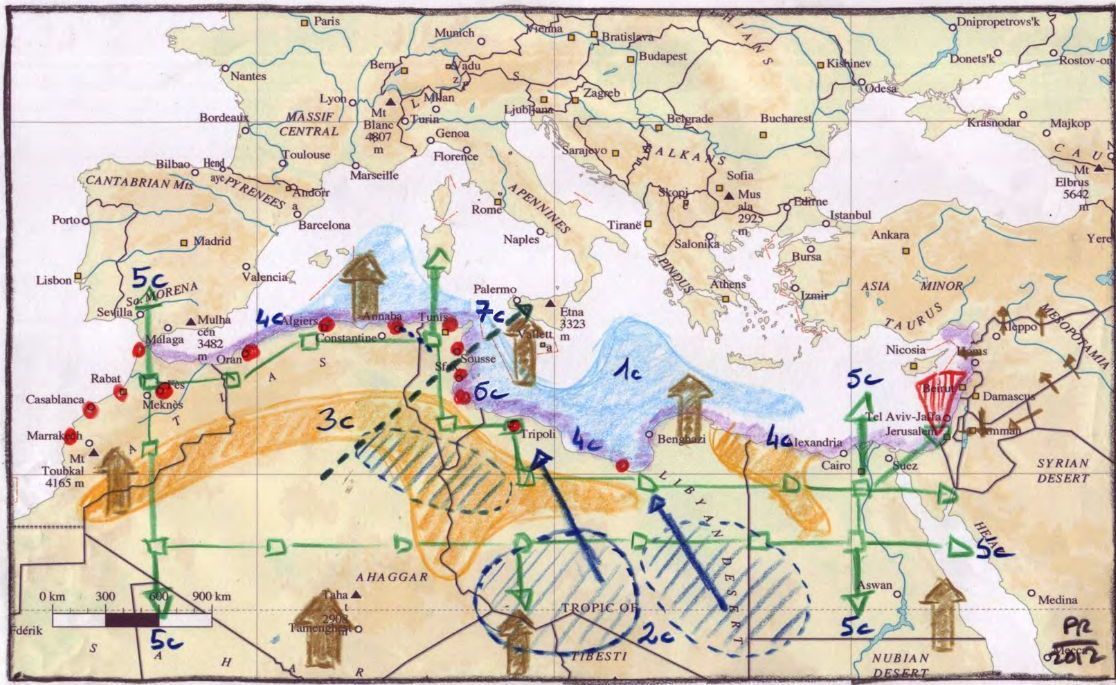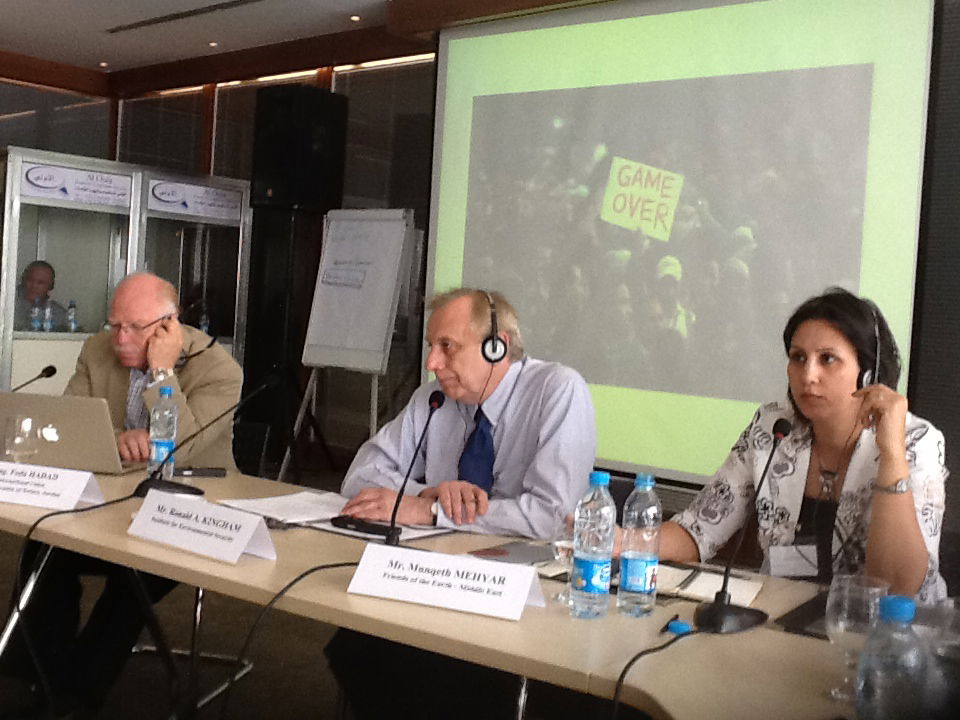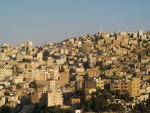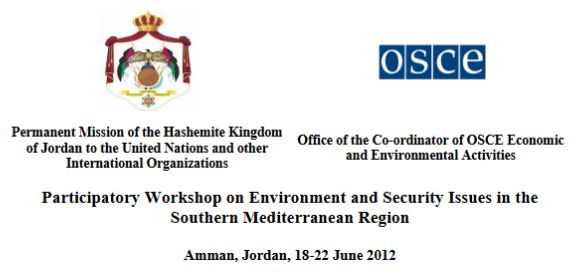Environment and Security Issues in the Southern Mediterranean Region

Amman, 18-22 June 2012
The Mediterranean Region has been identified as one of the most vulnerable areas in terms of environment and security linkages. Due to its climatic and topographic features, as well as the cross-boundary dimension of the Mediterranean Basin, intermixed with cultural, political and economic diversity, the region represents an area that poses potential for social and political instability, with repercussions that also affect European countries. Furthermore, energy security is an important element on the political and economic agenda of the Southern Mediterranean countries, who are not only important exporters of oil and natural gas, but have also vast potential with regard to the development of renewable energy sources, thus affecting future energy security policies in the region and beyond.
 The IES assisted with the facilitation of a Participatory Workshop on Environment and Security Issues in the Southern Mediterranean Region held in Amman, Jordan, 18-22 June 2012. The event was organised by the Office of the Co-ordinator of OSCE Economic and Environmental Activities in cooperation with the Permanent Mission of the Hashemite Kingdom of Jordan to the United Nations and other International Organizations.
The IES assisted with the facilitation of a Participatory Workshop on Environment and Security Issues in the Southern Mediterranean Region held in Amman, Jordan, 18-22 June 2012. The event was organised by the Office of the Co-ordinator of OSCE Economic and Environmental Activities in cooperation with the Permanent Mission of the Hashemite Kingdom of Jordan to the United Nations and other International Organizations.
The focus of the workshop was on the Southern Mediterranean region and in particular on the OSCE Mediterranean partners for Co-operation: Algeria, Egypt, Israel, Jordan, Morocco and Tunisia.
Key issues explored included:
- Region in Focus - Main Environment and Security challenges
- Water Scarcity and Land Degradation - Identifying the causes and looking for solutions
- Environmental implications of Climate Change
- Environmental implications of Energy and Security
- The role of the Civil Society
The aims of the workshop were to:
- Identify and map existing and especially new environmental issues that may have an impact on security as well as environmental implications of security policies in the region.
- Create wider understanding of the various national, regional and international frameworks and cooperation and coordination mechanisms related to environment and security issues in the region (including among governments, between governmental departments within states, between governments and civil society, between the military and civil society and among civil society organisations).
- Stimulate the OSCE Mediterranean partners for Co-operation dialogue by putting forward ideas and recommendations for increased national, regional and international action and solutions on environment and security issues including with regard to the role of the OSCE.
 The workshop was organised also in follow up to the MEDSEC initiative launched in Barcelona in 2009 by the OSCE in cooperation with the Center for International Relations and Development Studies (Fundacio CIDOB) and the Barcelona International Peace Resource Center (BIPRC), UNEP GRID-Arendal and the Zoi Environment Network.
The workshop was organised also in follow up to the MEDSEC initiative launched in Barcelona in 2009 by the OSCE in cooperation with the Center for International Relations and Development Studies (Fundacio CIDOB) and the Barcelona International Peace Resource Center (BIPRC), UNEP GRID-Arendal and the Zoi Environment Network.
For more information about the MEDSEC initiative, the report of the Barcelona workshop and maps covering specific issues (Agriculture, Desertification, Migration, Population, Resources, Climate Change and Water) view the publication: Environment and Security Risks in the Southern Mediterranean Region , published 20 March 2011.
Workshop Materials:
- Presentations:

PRESENTATIONS
Monday, 18 June 2012
Opening Session
Moderator: Mr. Goran Svilanović, Co-ordinator of OSCE Economic and Environmental Activities
- Opening Remarks by H.E. Ahmad Qatarneh, Secretary General of the Ministry of Environment, Jordan
- Opening Remarks by H.E. Ambassador Lamberto Zannier, Secretary General of the Organization for Security and Co-operation in Europe
- Statements by Delegations
Session I: Region in Focus. Main Environment and Security Challenges-The Mediterranean
Moderator: Mr. Ronald A. Kingham, Director, Institute for Environmental Security (IES)
- Keynote Speech by Mr. Munqeth Mehyar, Chairperson and Jordanian Director, Friends of the Earth -Middle East
Tuesday, 19 June 2012
Session II: Water Scarcity and Land Degradation–Identifying the Causes and Looking for Solutions
Moderator: Mr. Ikaros Moushouttas, Senior Advisor, IES / Former Member of the Policy Planning and Early Warning Unit in the Council of the European Union
- Statement on Water Security / Sustainability by Global Challenges Department, Directorate for Global Changes and Multilateral Political Relations, Ministry of Foreign Affairs of the Republic of Slovenia
- Statement on Water Security by Mr. Gidon Bromberg, Director, Friends of the Earth -Middle East
- Presentation on Water in Jordan: Water security and protection by Eng. Ali Subuh, Assistant Secretary General for Technical Affairs, Ministry of Water and Irrigation of Jordan
- Presentation on IWRM in Israel by Mr. Yakov Livshitz, Hydrological Service, The Israeli Governmental Authority for Water and Sewage
Session III: Environmental Implications of Climate Change
Moderator: Dr. Nasser Yassin, Faculty of Health Sciences, American University of Beirut / Fellow and Beirut Representative, IES
- Presentation on Environmental Implications of Climate Change by Eng.Rania Abdel Khaleq, Director, Environment Directorate, Ministry of Water and Irrigation, Jordan
- Presentation on Climate Change Implications by Dr. Nadim Farajalla, PhD, Research Director, Policy and Research Forum on Climate Change and the Environment in the Arab World, Issam Fares Institute for Public Policy and International Affairs, American University of Beirut
Session IV: Environmental Implications of Energy and Security Policies
Moderator: Mr. Marc Baltes, Senior Advisor / Vienna Representative, IES
- Presentation on Environment in Jordan: The Challenges, Achievements and Trends by Eng. Haitham Al-Adaileh, Ministry of Environment, Hashemite Kingdom of Jordan
Session V: The Role of the Civil Society
Moderator: Mr. Ronald A. Kingham, Director, Institute for Environmental Security (IES)
- Presentation on Local Community Participation for Sustainable Land Use Management by Eng. Fidaa Haddad,Regional Office for West Asia, International Union for Conservation of Nature -Jordan
- Presentation by Mr. Munqeth Mehyar, Chairperson and Jordanian Director, Friends of the Earth -Middle East
Session VI: Mapping Exercise Methodology
- Mr. Philippe Rekacewicz, Cartographer and Fellow, IES / Journalist, Geographer and Cartographer, Le Monde diplomatique, Paris
- Mr. Matthias Beilstein, Cartographer, Zoi Environment Network09.30 –10.30 Mapping
Session VII: Main findings of the Mapping Exercise
Moderator: Mr. Philippe Rekacewicz, Cartographer and Fellow, IES / Journalist, Geographer and Cartographer, Le Monde diplomatique, Paris
Session VIII: Closing Session: Recommendations and the Role of the OSCE
Moderator: Ms. Desiree Schweitzer, Deputy Co-ordinator of OSCE Economic and Environmental Activities
- Mr. Marc Baltes, Senior Advisor / Vienna Representative, IES